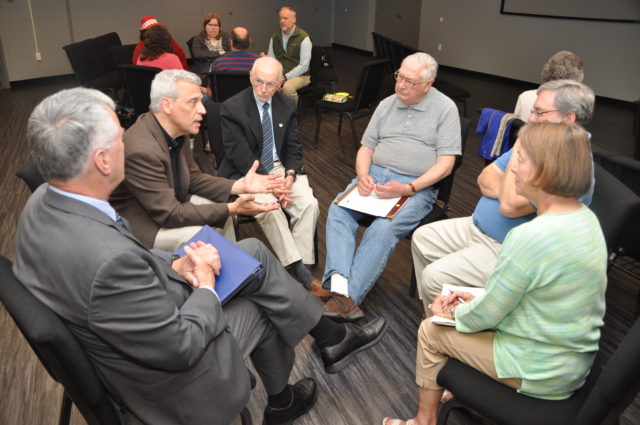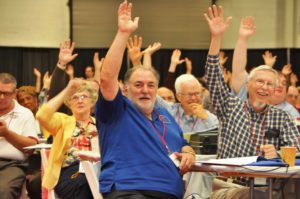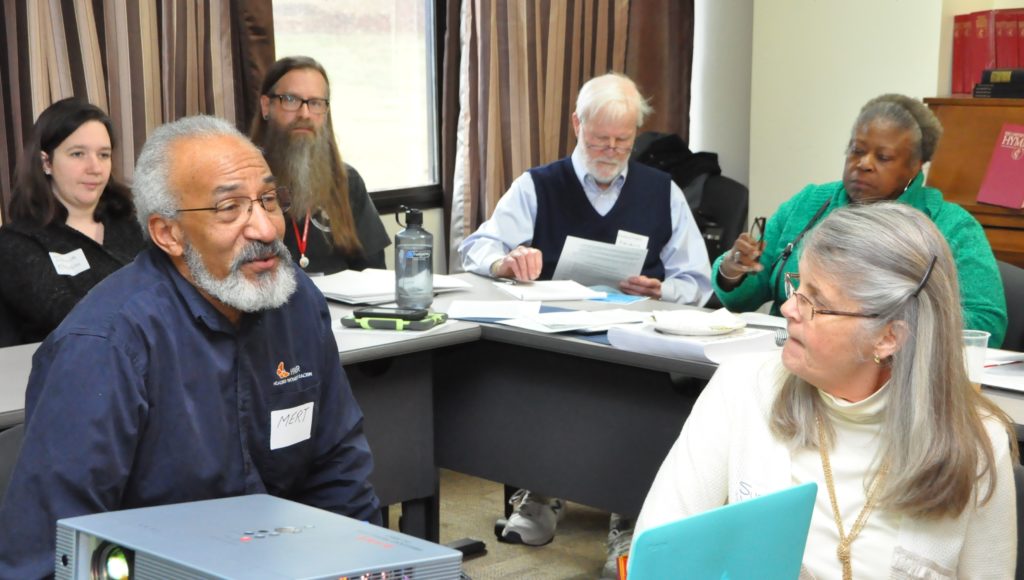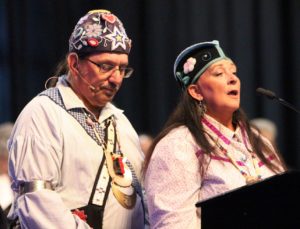
“I pledge allegiance to the Flag of the United States of America, and to the Republic for which it stands, one Nation under God, indivisible, with liberty and justice for all.”
The U.S. Congress adopted that Pledge of Allegiance to the nation and its flag 75 years ago (although the words “under God” were added in 1954). While we embrace most of it with little argument, the final six words seem to be under constant debate.
That debate now spills over into our church of many nations, as we wrestle with competing values of liberty and equal justice under the laws of both church and state.
Religious liberty, civil rights, free political speech, equal inclusion and access, church unity or disunion—these values and aspirations are replete among the 27 resolutions that The United Methodist Church’s Eastern PA Conference will consider and vote on at its annual session June 15-17. They address laws of both our U.S. Constitution and our church’s Book of Discipline.
 Liberty and justice concerns
Liberty and justice concerns
Five resolutions relate to political laws and policies:
- One supports a Citizens Commission for Legislative and Congressional Redistricting to reform the partisan, census-related practice of gerrymandering to redraw voting districts for political advantage. The next census happens in 2020, followed by redistricting again.
- Three resolutions deal with religious liberty, free political speech and freedom of conscience. One calls on the conference to advocate for repeal of restrictions against politically partisan activities by tax-exempt organizations like churches and to teach members of all ages about their “religious free-speech rights.”
- Another calls on the conference to contend that while “basic human and civil rights should be available to all persons regardless of age, gender, marital status or sexual orientation, such rights do not extend to protecting every behavior or practice of all persons.” Exempted would be homosexuality, which the church’s Book of Discipline deems “contrary to Christian teaching.” The conference is asked to advocate for laws allowing individuals and business owners, because of their religious conscience, to refuse services for practices and activities which they believe to be wrong, immoral, or incompatible with Christian teaching.”
- A third in this trio of resolutions counters these two by asking the conference to denounce any legislation that would allow such discrimination because it “denies equal protection under the law to the LGBTQ community as a protected class.” That resolution repeats one submitted last year that in lieu of debate, led to a recent dialogue on religious freedom and LGBTQ (Lesbian, Gay, Bisexual, Transgender, Queer or Questioning) civil rights, hosted by Bishop Peggy Johnson.
- A Fair, Humane Immigration Policies and Practices resolution, offered by the conference’s Immigration Rapid Response Team and allied groups, calls for a commitment to work against racism and violence directed toward immigrants and to oppose immigration policies that exclude refugees because of their race, religion or national origin. It encourages churches to help members provide hospitality to immigrants and refugees in their communities and to advocate for just, humane immigration laws and policies.
LGBTQ rights vs. church law
Seven resolutions relate to equal access for LGBTQ people seeking ordained ministry and marriage in the church, versus continued adherence to and enforcement of disciplinary restrictions. These resolutions reflect the denomination’s apparent impasse that now threatens its unity.
- Two resolutions, offered annually, seek “full inclusion of LGBTQ persons” in the church, including consideration for ordained ministry and the right to be married by UM pastors in UM churches. Another resolution asks the bishop to “try to avoid bringing clergy who perform same-sex marriages to trial and to seek just resolution in other ways until the General Conference committee (sic) on A Way Forward reports its recommendations in 2019.”
- Conversely, the Evangelical Connection seeks assurance that all candidates for ministry must certify their intent to comply with the church’s doctrines and disciplinary “standards for conduct, sexual ethics and marriage.” The group also wants the conference to require boards and agencies to “uphold all Discipline standards” and bishops to “teach our doctrines and enforce our discipline with complete integrity and compassion.”
- The Evangelical Connection further proposes that the conference call on the Council of Bishops’ Special Commission on a Way Forward—which has announced a special General Conference February 23-26, 2019, in St. Louis, Mo.—to regularly update the Church “about its progress or lack thereof,” and to bring forth a recommendation that would “definitively resolve our debate over The United Methodist Church’s sexual ethics and its understanding of marriage.”
- Moreover, the conservative group wants the bishops’ Commission to recommend covenantal adherence and accountability to the church’s polity, while rejecting the notion of allowing local churches to choose different policies around ordination and marriage. They also ask that if no viable plan of unity seems possible, the Conference would call on the Commission to “prepare a plan of separation that honors the consciences of all the people of the church and allows them to separate in peace and goodwill.”
Healing wounds of racism, and domestic violence
Three resolutions are offered by the conference’s Commission on Religion and Race to affirm and seek continuation of conference anti-racism efforts.
- One recognizes the “developmental, relational and transformational impact” of the former Healing the Wounds of Racism training experience, a ministry begun 21 years ago to engage members “in the sacred work of dismantling racism.” It also affirms the ongoing training offered in Changing Racism workshops, which are mandatory for conference staff and clergy and lay ministers serving as pastors.
- Another CORR resolution affirms and calls for more efforts throughout the conference to challenge racism and inequity and to develop leadership and viable ministries among all racial-ethnic members, churches and communities.
- And a third cites the conference’s engagement in Call to Action initiatives, including dialogues and activities among churches and districts seeking racial understanding, justice and healing. It urges more to be done to respond to goals put forth in the 2016 Northeastern Jurisdictional Conference’s resolution that calls for racial justice and reconciliation and more support for black churches and communities.

Healing Wounds, Changing Racism
Mert Shane (left) and the Rev. Susan Worrell, co-leaders of Healing the Wounds of Racism and the Commission on Religion and Race (CORR), respectively, jointly led the first Changing Racism: Continuing the Conversations seminar Jan. 28, an experimental follow-up to the biannual Changing Racism workshop, which is a successor to past Healing the Wounds workshops. CORR submitted an Annual Conference resolution affirming these two anti-racism ministries and the impact they have had on conference members over two decades. The next Continuing the Conversations seminar will occur June 24. John Coleman photo
 A Conference Committee on Native American Ministries (CoNAM) resolution calls for “Continuing the Journey toward Healing and Wholeness with Indigenous Peoples” and pursuit of the goals of the conference’s Act of Repentance celebrated at the 2016 Annual Conference. That includes electing CoNAM representatives in all churches to help their members learn about Native American cultures, contributions and concerns, while celebrating Native American Ministry Sunday annually.
A Conference Committee on Native American Ministries (CoNAM) resolution calls for “Continuing the Journey toward Healing and Wholeness with Indigenous Peoples” and pursuit of the goals of the conference’s Act of Repentance celebrated at the 2016 Annual Conference. That includes electing CoNAM representatives in all churches to help their members learn about Native American cultures, contributions and concerns, while celebrating Native American Ministry Sunday annually.
Another resolution calls on the conference to establish a Domestic Violence Response Team to address the “epidemic of domestic violence” occurring in homes and communities and still largely ignored by churches. It advocates for more churches to offer support to victims and promote awareness of the problem.
New rules for episcopal endorsements
The remaining resolutions propose:
- New rules for determining conference endorsement of episcopal candidates.
- Discontinuance of four closed churches and transfer of a fifth church to the Susquehanna Conference because of its closer relationships with entities there.
- Equitable Compensation recommendations for 2018.
- Rental/housing allowances for retired or disabled clergy.
- Changes in the clergy retirement security program and the funding of benefit obligations for next year.
- Changes in financial policies regarding allocation of funds to pay conference expenses, reduce the unfunded liability for pre-1982 clergy pensions and build reserves. Also proposed in the resolution titled “Repeal and Re-Enactment of Resolution 2012–21” are changes to forgive past-due apportionment payments and “historic balances” of churches, except for balances on “billed funds” still owed to the conference for clergy pensions, church staff health benefits, property and liability insurance, and workers compensation.
- The same resolution also proposes releasing churches of the former, racially segregated Delaware Conference from any further responsibility for historic balances, except for their unpaid health benefit and pension contributions, “as an act of justice.”
Approval of 10 applications for projects seeking endorsement for local church support as Conference Advance Specials for July 2017 through June 2018.
Conference to vote on UM constitutional changesThe 2016 General Conference approved five amendments to The United Methodist Church’s Constitution, and now they must be approved by two-thirds of the total members of all annual conferences in order to be ratified. Our General Conference delegates will present the amendments for debate and votes, but they cannot be changed or amended further. The Council of Bishops will certify the votes of all annual conferences and announce their outcomes at its next meeting. The amendments address matters of gender equality, inclusiveness in membership, elections of General Conference delegates and bishops, and episcopal accountability. The gender equality amendment declares the equality of men and women before God and asserts that the denomination will “seek to eliminate discrimination against women and girls…in every facet of its life and in society at large.” The inclusive membership amendment would add gender, ability, age and marital status to the list of characteristics that do not bar people from membership in the church. The list would then read “race, color, gender, national origin, ability, age, marital status or economic condition.” The delegate elections amendment specifies that elections of delegates to General Conference as well as jurisdictional and central conference meetings will include open nominations from the floor at annual conference sessions and be determined by “a minimum of a simple majority of the ballots cast.” The episcopal elections amendment states that central conferences are to elect bishops at regular sessions of the central conference, not at extra sessions, “except where an unexpected vacancy must be filled.” The bishops’ accountability amendment adopts provisions for the Council of Bishops to hold individual bishops accountable when their actions have global or churchwide impact. It comes in response to a Judicial Council ruling that it is unconstitutional for the Council of Bishops to hold its members accountable, limiting the handling of complaints to the jurisdictions or central conferences where bishops are elected. |
